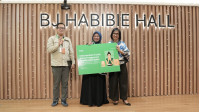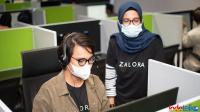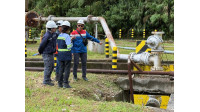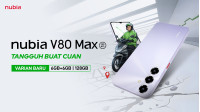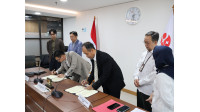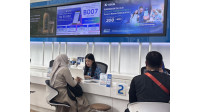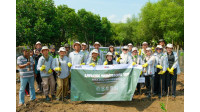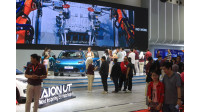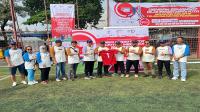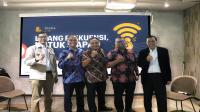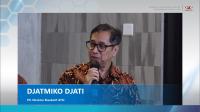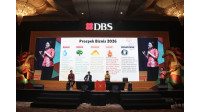Opini/Kolom
Ripe Momentum for 5G Technology in Accelerating Indonesian Digital Transformation Ahead of G20 Summit
07:45:00 | 09 Mar 2022
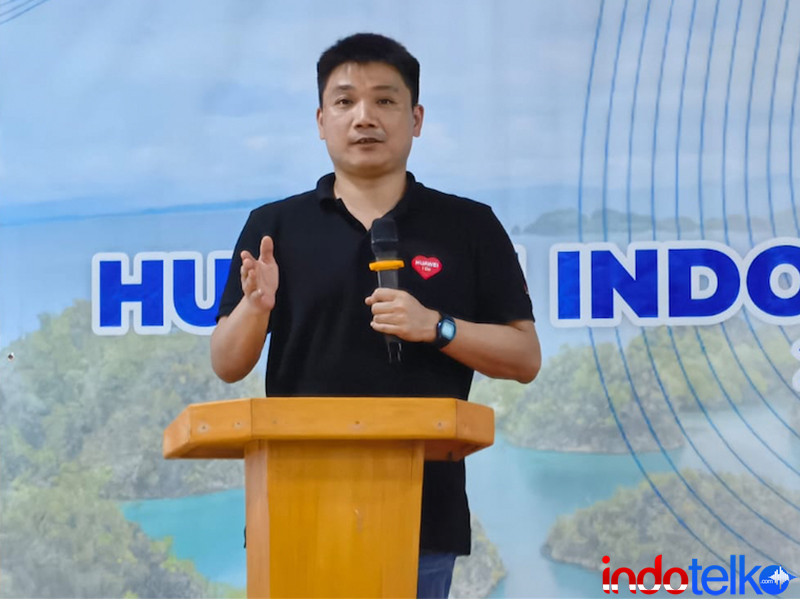
Digital transformation has been gaining traction over the past few years. When the pandemic came out of nowhere, for a moment, there was the question of whether digital transformation would continue to build off its momentum or come to a halt, as did many other industries.
But it was no question at all: not only did digital transformation manage to carry on, but it also picked up its pace and even helped countless industries and businesses transform their fundamental operations so that they could survive and thrive, especially as customers and everyday activities have shifted online for the most part.
However, digital transformation needs to be driven by several underlying technologies. It also requires a coordinated international effort that lays the groundwork for its widespread adoption.
This year, the privilege of having the prestigious Group of 20 (G20) Presidency falls upon Indonesia’s shoulders. One of the world’s most important meetings of its kind, the G20 brings together governments of the twenty largest GDPs in the world to align priorities, goals, and missions – in the hopes that, together, progress and prosperity can be achieved. “Recover Together, Recover Stronger” will be the summit’s unifying message, with three priority issues: Digital Transformation, Sustainable Energy Transition, and Global Health Architecture.
In pursuant to those issues, the Ministry of Communication and Informatics as the leader of the Digital Economy Working Group at the G20, will be giving emphasis on 3 strategies: post Covid-19 recovery and connectivity, digital skill and literacy, and trustworthy cross-border data flow.
With all eyes on the G20 meeting, there is in fact another “G” that we should also be paying attention to: 5G technology.
5G is an especially salient point when we talk about this year’s G20. 5G can help with achieving the goals of economic transformation, renewable energy, and inclusive healthcare.
In the global stage, 5G technology has been extensively applied across sectors and industries with ample of use cases being explored and developed to contribute more towards digital communities. However in Indonesia, the technology has yet been optimized in the scale it should be. Last year’s 5G commercial rollout and deployment could be a good start for the 5G technology development to move forward and drive the country’s digital transformation.
The G20 summit is a good opportunity to explore 5G potentials and how it can be utilized to tackle plethora of challenges and even anticipate potential threats.
Let’s look at how 5G can contribute and help address each priority issue of the G20.
5G Hits All Three Priority Issues
We can regard 2022 as the year for the 5G technology. This year, we will be witnessing the country focus on accelerating the deployment of 5G broadband thanks partly to a much-improved spectrum management. Spectrum roadmap has been defined in 2022 auction plan in 700 MHz and 26 GHz this year, while coming in the pipeline is the 3.5GHz auction, scheduled in 2023.
As fiber-based connectivity still exhibits low penetration, the government has been aggressively reaching the real 5G experience by optimizing the utilization of the fiber-based networks, through infrastructure sharing among players and support to local governments to issue easier deployment permits.
Currently, business models for the 5G use cases are being assessed considering high demands from cities, industries and consumers thus creating momentum to accelerate digital economy transformation in Indonesia. Not to mention, right in front of our door step is the latest mega project of Indonesia’s New Capital that aims high speed connectivity and intelligent city ready to be integrated by 2024. Indeed, the time is ripe for digital transformation.
Digital transformation is equitable: it should impact every person, every business, and every sector. In business and commerce, 5G-fueled digital transformation will help businesses accelerate at a fast pace.
Post-COVID-19 pandemic recovery and connectivity are one of Indonesia’s digital transformation goals for the economy, and 5G represents a tremendous opportunity in this field. Being the fifth generation of connectivity, 5G means increased bandwidth, reliability, and lower latency. The advent of 5G deployment will power up businesses to recover by fully harnessing the capabilities of advanced data-driven technologies such as IoT, artificial intelligence (AI), cloud and machine learning. Furthermore, 5G may also provide the push needed for Indonesia – and the world – to continue forward with our collective infrastructure, generating the connectivity required for economic development.
Climate change is yet another challenge that can be tackled with 5G. We are now in the middle of a pandemic, but climate change is the larger challenge ahead. Reversing or even eradicating the whole phenomenon is not easy, but technology can be one factor to ensure big wins in implementing sustainability and combating climate change. In Indonesia, developing green economy remains chief national priority to achieve zero carbon emission by tech-driven initiatives.
As brought up earlier in the SMART 2020 report by the International Telecommunication Union (ITU), the implementation of 5G across all information and communication technology (ICT) would be able to cut down 15 percent of all global emissions, thanks essentially to changes in processes and behavior across multiple vertical industries, powered up by a high-capacity, ubiquitous, and low-latency 5G network. Green and low-carbon technologies backed by 5G will definitely become new drivers for sustainable development.
In the long run, the entire public and private sectors need to make sustainability their priority; in order to achieve this, they must have in-depth knowledge of what technologies should be applied.
The pandemic has especially put a strain on healthcare providers to innovate at an unprecedented rate. However, the global health infrastructure is currently fragmented, characterized by great discrepancies among countries – and even within the same country – and this has only been exacerbated by the pandemic. 5G technology, with its high speeds and reliability, makes it possible to democratize healthcare with telemedicine and even exciting, revolutionary use cases such as remote surgery. A patient in the outskirts and remote areas can receive the same access to equal treatment as one living in big cities. In the digital age, we imagine this can be amplified on a much larger, much broader scale, helping those nations in dire need for quality healthcare infrastructure.
There are some examples of this happening. During the pandemic, Huawei has also provided its cloud, AI, and analytics technologies to renowned hospitals including Pertamedika and RSPAD Gatot Soebroto to help speed up COVID-19 diagnoses with higher accuracy. Not only in Indonesia, Huawei is also working with Thailand’s largest hospital, Siriraj Hospital, to provide smarter healthcare – including remote healthcare, intelligent imaging and analytics, and autonomous vehicles to reduce medical personnel’s workloads as well as COVID infection risks.
Thus, empowered countries like Indonesia and Thailand can lead by example and share these success stories and best practices around the world that will, as the pandemic has taught us, coordinate the global health infrastructure to move and contain future health threats in unison instead of as individual moving parts.
Huawei’s ‘I Do’ Commitments
Huawei is a company defined by commitments – both on the technology side, and on the people side. In Indonesia, our umbrella commitment is called “I Do”, signifying our preference for real actions with real impact. This is further divided into four areas of focus: “I Do Create” and “I Do Collaborate” represent our values as a technology provider and member of Indonesia’s ICT ecosystem, while “I Do Contribute” and “I Do Care” demonstrate our involvement in Indonesia not just as a private company, but also as a social institution. Through these four commitments, we are aiming to create a legacy greater than ourselves – that as the enabler of a digital Indonesia.
Through I Do Create, we are committed to developing the most advanced solutions in ICT and renewable energy to help governments and businesses with
I Do Collaborate sees us working together with government, academia, industry, communities, and other stakeholders. We are constantly sharing our experience, learnings, and best practices, including pertaining to global security and verification standards, as well as Huawei’s own Product Security Baseline, to help increase the knowledge of our stakeholders in Indonesia. Positive change towards the direction of 5G can only happen by having the proper knowledge, and since we began our research into 5G connectivity as early as 2009, knowledge is something we have in abundance.
As part of the ICT industry, we are not satisfied being just a solutions provider. There is more we can contribute, for Indonesia and the world. A sustainable technology ecosystem means preparing the human resources needed to carry on this progress well into the future, decades from now. Unveiled in late 2019, Huawei’s target is to prepare a total of 100 thousand digital talents by 2025. In only 14 months, as 2021 came to a close, Huawei Indonesia has trained over 52 thousand digital talents, or equivalent to over half its 5-year target. That is the contribution we wish to give through our commitment I Do Contribute.
And finally, I Do Care is how we give back to society. Through this commitment, we immerse ourselves in the community and in the cultures of Indonesia. Every year, Huawei organizes charity events during the fasting month of Ramadan and Idul Adha Qurban to contribute more to the most needy, such those in orphanages across 15 cities in Indonesia. These initiatives always engage 2,000 Huawei employees in 4 working areas who are 90% Indonesians. This commitment is based on belief that we are in Indonesia, for Indonesia and by Indonesians.
Keeping in mind Indonesia’s presidency over the 2022 G20 summit, we are prepared to lend an extra hand and offer even more support, ensuring the summit’s success for Indonesia and the world.
Indonesia for the World: What 2022 G20 Presidency Means
The G20 represents an important melting pot between the so-called ‘global north’ and ‘global south’ – the developed and developing parts of the globe, respectively – where not only the former can teach the latter, but even developing and newly industrialized countries such as Indonesia have new experiences to share with the world, too. In terms of 5G specifically, this may exponentially broaden 5G adoption across member states and eventually all corners of the globe. The combination of 5G-enabled digital economy transformation, coupled with green energy development, presents our future world with incredible opportunities.
With 8 months to go until the summit, Huawei wishes for another successful G20 with Indonesia as this year’s host, complete with great discussions that will benefit and even bring a fully connected and intelligent Indonesia, for the better.
Written by : Jacky Chen, CEO Huawei Indonesia
Artikel Terkait
-
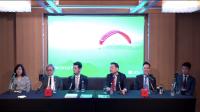 Industry - 05:04:00 | 08 Jul 2025
Industry - 05:04:00 | 08 Jul 2025Opini & Kolom
Deeskalasi mendadak dalam ketegangan AS-Tiongkok mengejutkan pasar -
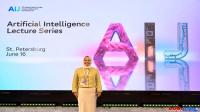 Indepth - 14:08:36 | 24 Jun 2025
Indepth - 14:08:36 | 24 Jun 2025Kolom Opini
Bahaya terbesar AI adalah kesombongan manusia yang merasa sudah memahaminya terlalu dini -
Global News - 07:51:00 | 09 Jun 2025
Opini & Kolom
Loyalty fraud adalah ancaman nyata bagi lembaga keuangan dan bisnis di Indonesia -
 Global News - 07:19:00 | 20 May 2025
Global News - 07:19:00 | 20 May 2025Opini & Kolom
Virtualisasi ada di jantung pengembangan jaringan telekomunikasi yang ideal -
 Indepth - 06:01:35 | 22 Mar 2025
Indepth - 06:01:35 | 22 Mar 2025Kolom Opini
Pusat data merupakan tulang punggung interkoneksi bagi seluruh layanan digital modern
Rekomendasi
Berita Pilihan
More Stories
PR Newswire







